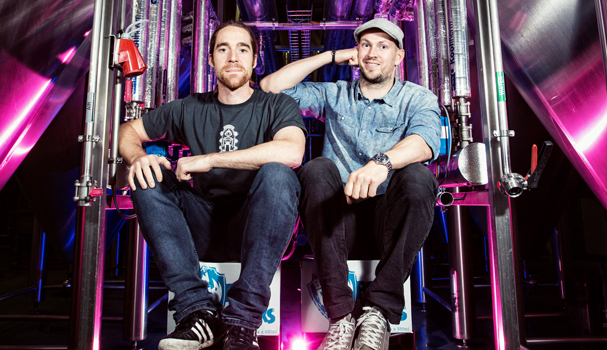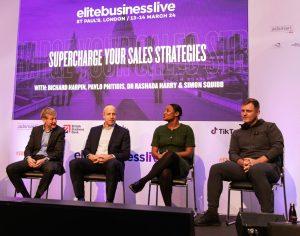When the UK smoking ban came into force in July 2007, pub landlords warned about the implications of outlawing lighting up in pubs. The regular ale drinkers would stay away, they said. The Stella Artois-swigging twentysomethings would attend house parties where they could chainsmoke their Benson & Hedges until the sun came up.
They weren’t wrong. Pubs began closing at an alarming rate, but the smoking ban wasn’t the only cause. As the recession kicked in, pubs struggled under the weight of ever-increasing beer duty, business rates and rental costs. That’s not to mention the ‘cheap as chips’ supermarket booze deals that were keeping people indoors before they headed straight to the clubs. At the same time, overall consumption of beer in Western Europe began to slide. The multinational beer brands started to see the fizz taken out of their profits. But whilst the mainstream beer companies are largely in decline, a new drinks brand has emerged from the fray with one key goal in mind: to breathe new life into the Great British pint.
Six years after starting their business, James Watt, co-founder of BrewDog, the craft beer brand with 210 employees and turnover of £19m, says the aim remains the same as it was when he and Martin Dickie first set up shop in 2007. “The biggest mission of our business is to try and encourage people’s passion for great beer and show them that there is an alternative to the mainstream, lowest common denominator, mass-market beers that dominate the market,” he explains.
Much of the company’s branding is based on the premise that the company is a foil to the established beer companies operating globally. “Our flagship beer is called Punk IPA. We see what we do as a modern day rebellion against beers which are bland, tasteless and mass market; we like to think we’ve got the same attitude against the old school beer incumbents as the punks had against pop culture,” says Watt. “Ours is a rebellion against the bastardisation of beer.”
Watt, now 31, has demonstrated an impatience for the tried and tested methods of doing things since he was a child. “I hated school,” he says. “I was always complaining to teachers about how badly they were doing things and telling them how to do their lessons better.”
Bored and frustrated, by the time he was of secondary school age, Watt was skipping classes to go out fishing with his father and grandfather. Juggling his fishing expeditions with school work, Watt secured a place at the University of Edinburgh. “I very reluctantly studied law and economics because I felt I should study something.” Graduating in 2004, Watt took a job in an office – which he quit after just two weeks.
“I absolutely hated it. I studied for four years to get a job that I lasted two weeks in,” says Watt. “I looked around the office and saw people in their fifties doing exactly the same as I was doing, which was just glorified admin. So I thought, ‘to hell with this’.”
A better option, it seemed, was to follow in the footsteps of his forebears: Watt spent the next five years working full time on a fishing boat and studied for his captaincy. He even continued to work as a fisherman during the first two years of BrewDog’s inception, until he and Dickie drew salaries.

Dickie and Watt had been firm friends since meeting in their English class at the age of 12 in their native Aberdeen. They both later studied in Edinburgh, though attending different educational institutions, and shared a home in the city. One of their shared passions was for tasty beer. But we’re not talking about the ‘£1 a pint’ nights it’s easy to associate with students and recent grads. No, Dixie and Watt took an altogether different approach to beer drinking.
“A long time before we set up, we used to make beers at home,” explains Watt. “When I was working on the boat, my garage was converted into a mini alchemy zone where we used to make all of these crazy beers. We were massively frustrated that we couldn’t find any beers we wanted to drink in the UK, so we thought the best thing to do was to make our own.”
The beer aficionados began importing craft beers from America before attempting to copy them in the garage. “Sometimes they’d work; sometimes they wouldn’t work so well and they’d taste like a French fry,” Watt laughs.
During his time on terra firma, Watt would accompany Dixie to various beer tastings, and on one such trip they encountered the late Michael Jackson – an influential beer and whisky writer (not to be confused with the pop star). “We met him in London where he was doing a beer tasting and talk, and we took one of our beers we’d brewed at home for him to taste. He told us to quit our jobs and start making beer.”
They followed his advice. On their return to Aberdeen, Watt and his business partner obtained a £20,000 bank loan, some second-hand stainless steel tanks and leased an industrial unit that, by Watt’s own admission, was “falling apart”.
“We cobbled everything together ourselves, whether we had to beg, barter or bootleg. We did a lot of the welding and wiring and just got everything set up,” Watt recalls. Despite having brewed in smaller quantities in the past, not everything went to plan initially. “We had to condemn the first couple of batches – not because they weren’t drinkable, but because we were stupid,” says Watt.
The first batch, he explains, was contaminated after his phone, car keys and a mercury thermometer fell out of his shirt pocket and into the mash tank. And the second batch didn’t fare much better. “We were trying to save money so we bought some cheap hoses, but they made the beer taste like plastic, so we had to lose that as well.” The pair then stumped up another £500 to make a third batch.
According to the Sunday Times Fast Track, BrewDog is now the UK’s fastest-growing food and drinks company. Did the start-up’s success come as a surprise to its founders? “No, not really,” says Watt, his response driven by conviction in the quality of the product rather than arrogance.
“Even when we were just two humans and a dog filling bottles by hand, sleeping on sacks of malt on the floor, driving delivery vans and working 20 hours a day, we were really ambitious,” he explains. “If you look at beer in the UK, most people think beer is something you go out and you drink eight pints of. It’s cold and fizzy, it has no flavour. You fall over, you have a kebab. Then you wake up the next day with a hangover and you tick Friday off your to-do list,” laments Watt.
Conversely, Watt and Dickie wanted to “elevate” the status of beer. “We wanted to get people drinking beer for the experience, not just the effect,” says Watt. “We wanted to put the taste, the flavour, the craftmanship, the passion back into people’s beer glasses. So even back then when we were only selling ten cases a week and the bank were shouting at us about not paying back our £20,000 bank loan, there was a lot of ambition behind what we were trying to do.”

Manufacturing is a famously cash-hungry affair which often means expansion is a double-edged sword for entrepreneurs. Grow too slowly and it’s difficult to make ends meet, pay staff and buy new equipment. Grow too quickly and the cash dries up quicker than you can repeat the entrepreneurs’ mantra, ‘cash is king’.
“It’s not just about staying afloat but having enough cash to expand aggressively,” Watt says. Part of the reason BrewDog has been able to grow strongly is that it has had widespread support from the UK supermarkets. Interest was initially sparked when BrewDog won a beer competition run by Tesco, the UK’s biggest grocer, after which they were offered a mammoth distribution deal. “I sat there with my best poker face on and didn’t mention the fact that it was two guys and one dog filling bottles by hand,” says Watt.
Tesco wanted 2,000 cases for distribution in 400 of its UK stores. This would mean vastly ramping up production – and quickly, too. The contract was due to start in four months. Watt and Dickie went to their bank, described the deal and asked for a further £150,000 loan – £100,000 for a new bottling line and £50,000 for new fermentation tanks. “They just laughed at us,” says Watt.
Undeterred, the duo walked into another high street bank and told them that a competitor had just offered them an excellent asset finance deal and if they could match the deal BrewDog would shift all the banking to them. “It worked,” exclaims Watt. “Business plan one: make copy beers and tell lies to banks. A small piece of advice for start-ups.”
The hustling paid off: the beer came off the line a week before it was due to ship to Tesco. And no sooner did the beer hit the shelves at Tesco did the phone start ringing at BrewDog HQ. “Sainsbury’s called. And then Waitrose. And then we started doing some export. It all just picked up from that point,” says Watt.
Watt’s descriptions of his dealings with the supermarket makes the process sound simple – far from the horror stories propagated by many entrepreneurs. Is it as tough as it sounds? “No. It’s because they’re idiots,” says the no-nonsense Watt. “We don’t negotiate with anyone. We tell the supermarkets, ‘this is what we do and this is how much it costs. If you want it, that’s fantastic, but that’s how much it’s going to cost. We’re not going to discount, we’re not going to do buy-one-get-one-free offers.”
The Scotsman says running promotions is a form of self-harm for entrepreneurial businesses. “It’s so easy to drive sales growth by discounting, but as soon as you start losing that gross margin, that’s the lifeblood of your business and that leaves you with nothing. You’ve got to believe in what you do and get a fair price. It takes four times as long to make Punk IPA as it does to make a standard industrial beer. We use twice as much malt barley. We use 20 times more hops in it. It’s a handmade artisanal product: the last thing we want to do is discount it.”
This is just one facet of a stellar sales and marketing strategy – one of Watt’s core responsibilities, along with finance, while Dickie spearheads management of the company’s production facilities in Ellon, Aberdeen. BrewDog’s unique approach to marketing is one of the ways it has managed to set itself apart from larger, often faceless corporate rivals.
“So many companies base their advertising or marketing strategy on this target market thing. They’ll say, ‘my target market is guys aged 24-35 that like football.’ It’s so silly,” chastises Watt. “I think it comes across as unauthentic and ingenuine, so what we’ve always done is completely selfish. We do something that we love and we would want to drink ourselves, we put bars together we’d wanted to go to ourselves, and if other people want to drink the beers that’s awesome. Regardless of who they are or what they do.”
Watt’s unconventional approach to marketing has certainly ruffled a few feathers since the company’s inception. There have been a few deliberately controversial wheezes: brewing beer at the bottom of the ocean; making 55% proof beer that was packaged in taxidermy; campaigning outside the Houses of Parliament with a dwarf to protest about not being able to serve beer in three-quarter pint glasses. “They’ve all been about how we can open up the discussion about what beer is and how it can be enjoyed,” says Watt.

Leveraging the power of social media has also been a major focus for the brewery, which wouldn’t be able to compete with the astronomical advertising spending power wielded by the conglomerates. “Conventional advertising and marketing for beer companies is all very traditional, it’s about how much money you can spend on TV or magazine advertisements,” says Watt.
“But all of a sudden you go online and it’s not about budget. It’s about how intelligent, how engaging your content is. In that type of arena we can not only compete with big companies, but knock their socks off. We’ve made videos that cost £200 to make, but more than half a million people have watched.”
Another strength of BrewDog versus more traditional rivals is that the company now has a catalogue of bars – 11 in the UK and one in Stockholm, Sweden. And that number is set to head in one direction only. BrewDog bars are set to open in Tokyo, Sao Paulo, Brussels, Rome and Berlin, and a further handful of locations being scouted in the UK. For Watt, the bars are a vital part of the company’s lofty ambitions to educate the general populace about the merits of beer. “We want to take customers on a journey and educate them, so we do things like beer pairings,” he explains. The company also imports glorious beers from around the globe, from as far afield as Japan, New Zealand and America.
One of the central tenets to BrewDog’s business strategy – and the reason it’s been able to raise the funds necessary to open bars and grow at such a rate – is its crowdfunding scheme Equity For Punks, whereby customers can become shareholders for the princely sum of £5. As a result, the company now has 12,000 shareholders (with Watt and Dickie hanging on to around 80% between them) and the business has raised £8m through the scheme, which has been run three times.
Whilst Equity for Punks was originally dreamt up out of sheer frustration with bank finance – or the lack thereof – the company’s highly original crowdfunding scheme has also helped engender a culture of trust and pride among customers and shareholders. “We’ve only been able to open bars in London and other places because of the Equity for Punks investment,” says Watt. “It means customers can take their friends to our bar in Shoreditch for example and know they helped fund it. That’s quite evocative.” ![]()
Share via:


















































